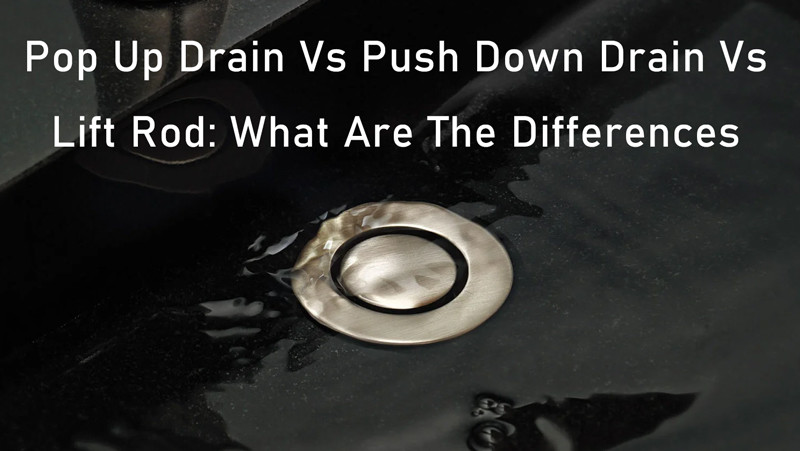
When it comes to the often-overlooked components of our daily lives, sink drains are hardly the first thing that comes to mind. However, understanding the differences between pop-up drains, push-down drains, and lift rod drains can greatly impact your daily interactions with these essential fixtures. In this exploration, we’ll dissect the differences between pop up drain vs push down drain vs lift rod, unraveling their unique features, advantages, and potential drawbacks.
Pop-Up Drains: The Time-Tested Classic
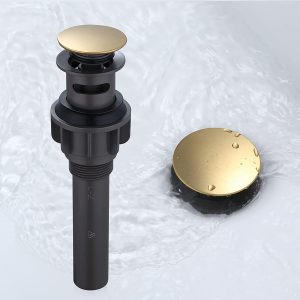
Design and Mechanism: Pop-Up drains are a classic choice, found in countless bathrooms across the globe. The mechanism is relatively simple: a stopper attached to a lift rod sits within the drainpipe. Pulling up on the lift rod raises the stopper, allowing water to flow into the drain. Pushing the lift rod down closes the stopper, preventing water from escaping the basin.
Advantages of Pop-Up Drains:
- User-Friendly Operation: The intuitive up-and-down motion of the lift rod makes pop-up drains accessible for users of all ages.
- Easy to Clean: Pop-up drains are generally easy to maintain, with the stopper easily removable for regular cleaning.
- Adjustable Water Flow: The lift rod’s control over drainage provides users with the flexibility to customize water flow to their liking.
Disadvantages of Pop-Up Drains:
- Mechanical Complexity: While generally straightforward, the mechanical components can wear over time, leading to potential maintenance issues.
- Limited Aesthetics: The design of pop-up drains may limit aesthetic options, which could be a drawback for those seeking a more customized look for their sink area.
Push-Down Drains: Streamlined Simplicity
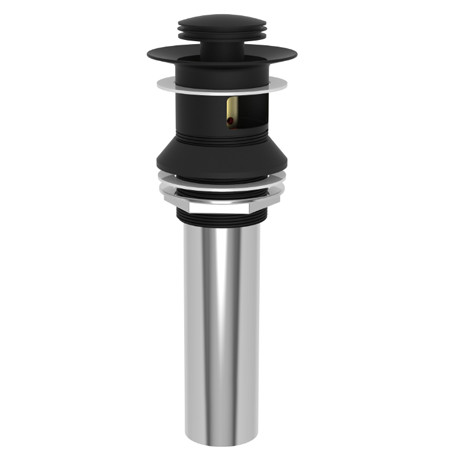
Design and Mechanism: Push-Down drains, also known as push-button or clicker drains, offer a modern alternative to traditional pop-up designs. In this mechanism, a button or cap integrated into the drain cover allows users to open and close the drain by simply pushing down on the button. The mechanism is concealed beneath the surface, creating a sleek appearance.
Advantages of Push-Down Drains:
- Sleek Aesthetics: Push-down drains contribute to a minimalist and contemporary look, enhancing the overall aesthetics of the sink area.
- Reduced Mechanical Components: With fewer moving parts than pop-up drains, push-down drains generally require less maintenance and are less prone to mechanical failure.
- Space-Saving Design: The absence of a visible lift rod creates a streamlined appearance, making push-down drains ideal for smaller bathrooms or sinks with limited space.
Disadvantages of Push-Down Drains:
- Potential for Jamming: Debris or hair accumulation around the push-down mechanism can lead to potential jamming and reduced functionality.
- Limited Customization: Similar to pop-up drains, push-down drains may offer limited customization options, potentially limiting choices for those seeking a personalized sink fixture.
Lift Rod Drains: Embracing Versatility
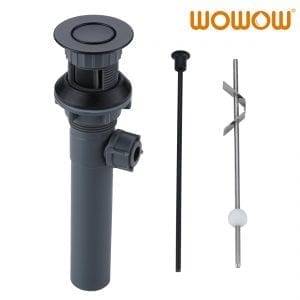
Design and Mechanism: Lift Rod drains, also known as lift-and-turn drains, provide a versatile solution that amalgamates elements from both pop-up and push-down designs. The stopper is controlled by a lift rod, similar to pop-up drains, but the lift rod is rotated instead of moving vertically to open or close the drain.
Advantages of Lift Rod Drains:
- Versatility in Operation: The rotational motion of the lift rod provides a different user experience, offering a unique touch to sink functionality.
- Durable Design: Lift rod drains often feature robust construction, contributing to durability and longevity.
- Easy Installation: Lift rod drains are generally easy to install, making them a convenient option for those looking for a functional yet straightforward solution.
Disadvantages of Lift Rod Drains:
- Potential for Wear: The rotating mechanism, while durable, can be susceptible to wear over time, requiring occasional maintenance.
- Learning Curve: Users unfamiliar with lift rod drains may experience a slight learning curve, as the rotational motion differs from the more common up-and-down action.
Pop Up Drain Vs Push Down Drain Vs Lift Rod: What Are The Differences
Choosing the best drain ultimately depends on your priorities and the specific requirements of your space.
For a Classic and User-Friendly Experience: If you prefer a timeless design with straightforward functionality and adjustable water flow, a pop-up drain could be your best bet. This option is particularly suitable for those who appreciate a traditional approach to sink drainage.
For a Sleek and Modern Aesthetic: If you’re drawn to a minimalist and contemporary look, a push-down drain offers streamlined simplicity. With fewer visible components, it not only enhances aesthetics but also reduces the likelihood of mechanical issues.
For Versatility and Durability: If you value versatility in operation and a durable design, a lift rod drain might be the ideal choice. While it comes with a slight learning curve, the rotational motion and robust construction can provide a unique and long-lasting solution.
In conclusion, the “better” drain mechanism depends on your personal preferences, the overall design of your space, and your willingness to engage with the particular features and maintenance requirements of each option. Understanding the nuances of pop-up, push-down, and lift rod drains empowers you to make an informed decision that aligns with both your functional needs and aesthetic preferences.
Conclusion: Making Informed Choices for Your Space
In the realm of sink drains, the choice between pop-up, push-down, or lift rod options ultimately hinges on individual preferences, aesthetic considerations, and desired functionality. Pop-up drains provide a classic and familiar experience, push-down drains offer a sleek and modern look, while lift rod drains bring a touch of versatility to the mix. Understanding these differences empowers homeowners and designers to make informed choices, ensuring that even the most mundane elements of our daily lives contribute to a seamless and enjoyable experience in our living spaces.
 WOWOW Faucets
WOWOW Faucets
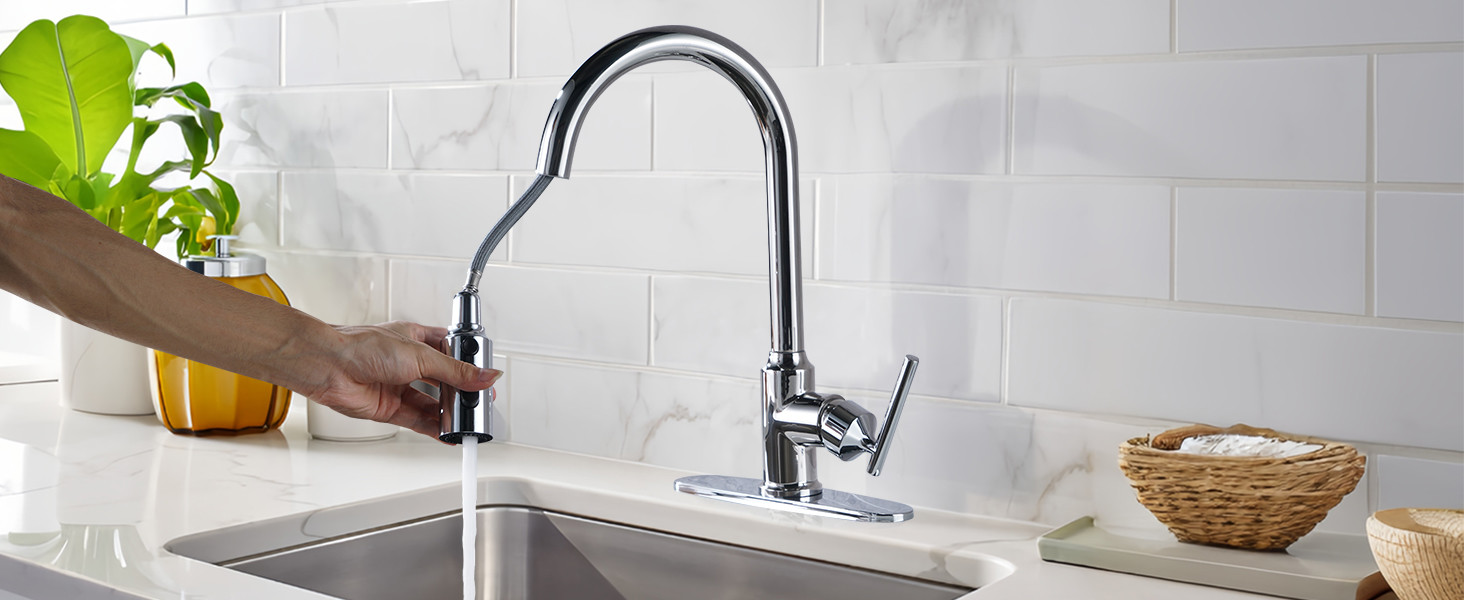




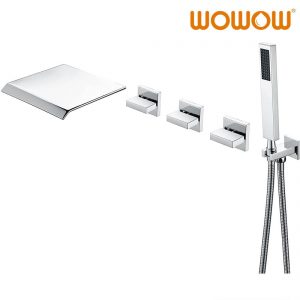
您好!Please sign in